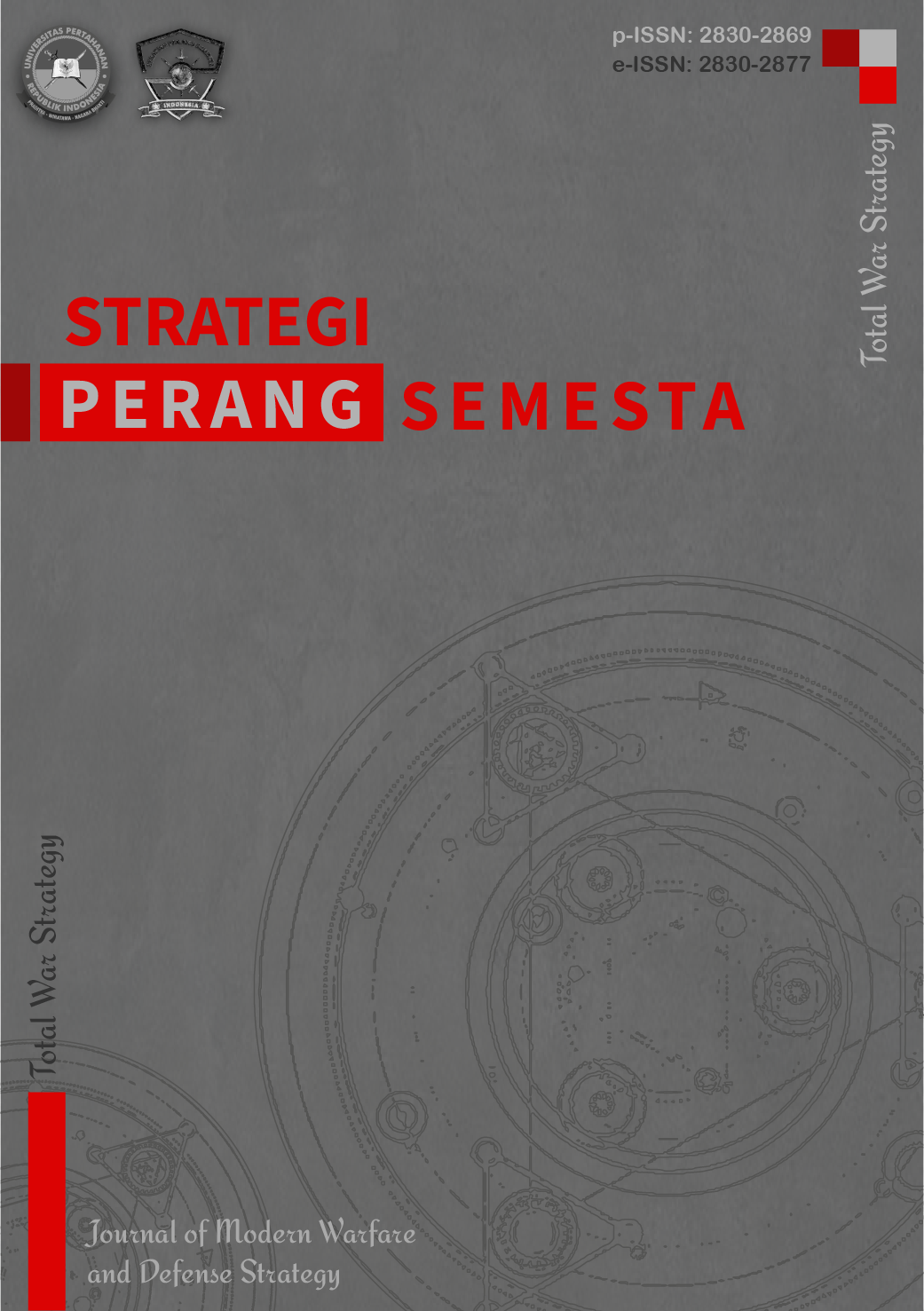The Prince Diponegoro’s war strategy from the perspective of the Indonesia total war strategy
DOI:
https://doi.org/10.56555/sps.v8i1.1187Abstract
This article will be focused on Prince Diponegoro’s War Strategy that implemented Total War Strategy through Guerilla Warfare tactic. The purpose and objectives of this article are analyzing the Prince Diponegoro’s War Strategy as the form of People’s Total War to be comprehended as the Indonesia’s total war strategy in facing threats so the readers will gain knowledge and deep information regarding the implementation of total war strategy. The qualitative method was conducted to create this article through historical research approach in designing the content of this article. The Total War theory was also implemented on this article. Based on the research result, it was found that the Indonesian War conducted by Prince Diponegoro is essentially a picture of the People’s total War which are not only carried out by taking up arms, but also engaged in political, social, economic, and cultural fields. The Total War Strategy has applied by fighters both in armed struggle, which Total War values characterized by: populist, territorial, the total, has been embedded in every breath of struggle. Whole community participation in accordance with their respective roles, and empowering all resources maximum national power to be further combined with military power, become a form of "totality" that is powerful in dealing with various forms of threats. From the history of the Indonesian War by Prince Diponegoro which gave birth to the Total War concept, has demonstrated and proven that the involvement of all components of the nation, both military and civilian (non-military) have an important role in accordance with their respective fields.
References
Abidin, Zainal, dkk. 2014, Buku Ajar Pendidikan Bela Negara, Jawa Timur: UPN Veteran.
AH. Nasution, 1954, Pokok-Pokok Gerilya, cetakan kedua, Jakarta: CV. Pembimbing.
Departemen Pertahanan Republik Indonesia II, 2008, Buku Putih Pertahanan Indonesia 2008, Jakarta: Kementerian Pertahanan.
Doetoyo, “Peran Litbang TNI AD: Dalam Mendukung Transformasi TNI AD Guna Mewujudkan Kemandirian Alutsista Modern”, dalam Buletin Dinas Penelitian dan Pengembangan Angkatan Darat Satiti Bakti Cakti, Edisi 63 Tahun 2018.
H. Mansur, Seri Pangeran Diponegoro, Jakarta: Mandar Madju, 2005.
Indrawan dan Widiyanto, 2016, Kebijakan Offset Dalam Membangun Kemandirian Pertahanan Negara, dalam Jurnal Pertahanan, Agustus 2016, Volume 6 No.2.
J. Kartasubrata, 1986, Partisipasi Rakyat dalam Pengelolaan dan Pemanfaatan Hutan di Jawa, Bogor: IPB.
Karim, Silmy, 2014, Membangun Kemandirian Industri Pertahanan Indonesia, Jakarta: Kepustakaan Populer Gramedia.
Kementerian Pertahanan RI, 2017, Bela Negara Dalam Perspektif Strategi dan Kebijakan Pertahanan Negara, Buletin WIRA Edisi Khusus Tahun 2017, Jakarta: Puskom Publik Kemhan.
Kementerian Pertahanan RI, 2019, Eksistensi TNI Dalam Menghadapi Ancaman Militer dan Nirmiliter Multidimensional Di Era Mileneal, Buletin WIRA Edisi Khusus HUT TNI ke-74, Jakarta: Biro Humas Sekjen Kemhan.
Marwati Djoened Poesponegoro, dan Nugroho Notosusanto (Eds). 2008. Sejarah Nasional Indonesia IV: Kemunculan Penjajahan di Indonesia, Jakarta: Balai Pustaka.
Moleong J Lexy, 2009, Metodologi Penelitian Kualitatif, Bandung: Remaja Rosdakarya.
Nasution, Abdul Haris, 1980, Pokok-Pokok Gerilya: Dan Pertahanan Republik Indonesia di Masa Lalu dan Yang Akan Datang. Jakarta: Angkasa.
Peter Carey. 2014. Takdir: Riwayat Pangeran Diponegoro (1785-1855). Penerjemah: Bambang Murtianto. Editor: Mulyawan Karim. Jakarta: Penerbit Buku Kompas. ISBN 978-979-709-799-8.
Samego, Indria, 2001, Sistem Pertahanan-Keamanan Negara: Analisis Potensi dan Problem, Jakarta: The Habibie Center .
Samsudar Makfi. 2019. Perlawanan terhadap Penjajah di Sumatra dan Jawa, Singkawang: Maraga Borneo Tarigas.
Sarjo, Djoko, 1990, Kepemimpinan Pangeran Diponegoro Dalam Perspektif Sejarah, Makalah, tanggal 20 Februari.
Sulasman, 2014, Metodologi Penelitian Sejarah, Bandung: Pustaka Setia.
Widjajanto, Andi, 2005, Evolusi Doktrin Pertahanan Indonesia, Jakarta: Ikrar Nusa Bakti.
Downloads
Published
Issue
Section
License
Proposed Policy for Journals That Offer Open Access. Authors who publish with this journal agree to the following terms:
- Authors retain copyright and grant the journal right of first publication with the work simultaneously licensed under a Creative Commons Attribution License that allows others to share the work with an acknowledgment of the work's authorship and initial publication in this journal.
- Authors are able to enter into separate, additional contractual arrangements for the non-exclusive distribution of the journal's published version of the work (e.g., post it to an institutional repository or publish it in a book), with an acknowledgment of its initial publication in this journal.
- Authors are permitted and encouraged to post their work online (e.g., in institutional repositories or on their website) prior to and during the submission process, as it can lead to productive exchanges, as well as earlier and greater citation of published work (See The Effect of Open Access).
Proposed Policy for Journals That Offer Delayed Open Access. Authors who publish with this journal agree to the following terms:
- Authors retain copyright and grant the journal right of first publication, with the work [SPECIFY PERIOD OF TIME] after publication simultaneously licensed under a Creative Commons Attribution License that allows others to share the work with an acknowledgment of the work's authorship and initial publication in this journal.
- Authors are able to enter into separate, additional contractual arrangements for the non-exclusive distribution of the journal's published version of the work (e.g., post it to an institutional repository or publish it in a book), with an acknowledgment of its initial publication in this journal.

